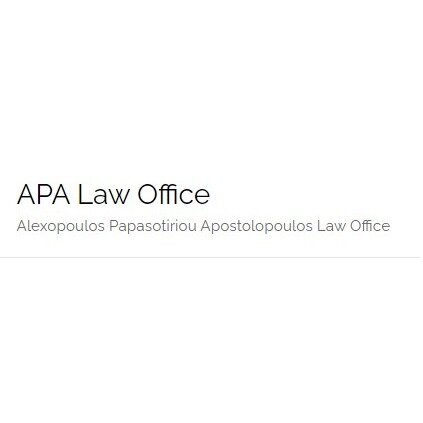Best Art & Cultural Property Law Lawyers in Pátrai
Share your needs with us, get contacted by law firms.
Free. Takes 2 min.
List of the best lawyers in Pátrai, Greece
About Art & Cultural Property Law in Pátrai, Greece
Art & Cultural Property Law in Pátrai, Greece, is a specialized legal field focusing on the protection and management of cultural heritage and art. This area of law manages issues related to the ownership, transfer, and restitution of art and artifacts, ensuring their preservation for future generations. Given Pátrai's rich historical and cultural significance, the city plays a crucial role in safeguarding Greece's national heritage. Consequently, local laws are designed to balance the interests of individuals, institutions, and the public in maintaining cultural assets.
Why You May Need a Lawyer
Individuals or organizations may require a lawyer specializing in Art & Cultural Property Law for various reasons. Common situations include:
- Disputes over ownership or provenance of art pieces or artifacts.
- Negotiations for the sale, loan, or exhibition of valuable cultural property.
- Assistance in complying with local and international laws related to cultural heritage protection.
- Guidance on tax and estate planning for art collections.
- Pursuing claims or seeking restitution for stolen or unlawfully exported art.
- Advice on cultural property aspects of archaeological projects.
Local Laws Overview
The legal framework governing art and cultural property in Pátrai and throughout Greece is deeply rooted in both national and international standards. Key aspects include:
- The Greek Constitution and laws, which emphasize the protection of cultural heritage.
- Law No. 3028/2002 on the Protection of Antiquities and Cultural Heritage, providing the foundation for legal protection of artifacts.
- Regulations overseeing the export and import of cultural property to prevent illegal trafficking.
- International conventions, such as the UNESCO Convention, aimed at protecting cultural property on a global scale.
Frequently Asked Questions
What is considered cultural property under Greek law?
Cultural property encompasses a wide range of objects that hold archaeological, historical, artistic, or scientific significance, such as antiquities, manuscripts, rare books, and works of art.
How can I verify the provenance of an artwork?
Verification of provenance involves researching the history of an artwork's ownership. This may require consulting archives, previous sale records, and expert opinions to ensure legal ownership and authenticity.
Can I export cultural property from Greece?
Exporting cultural property from Greece requires official permission from the Ministry of Culture and Sports, ensuring that the items are not of significant cultural value that must remain within the country.
What are the penalties for illegally exporting art or artifacts?
Penalties can include fines, imprisonment, and the confiscation of the items. Legal guidance is essential to navigate these severe consequences.
How is repatriation of cultural property handled?
Repatriation is addressed through diplomatic negotiations and legal claims, often resorting to international legal frameworks to resolve disputes over stolen or exported artifacts.
Does owning a piece of art automatically grant me the right to reproduce it?
No. Ownership of a piece of art does not include copyright unless explicitly transferred. Artists or their estates usually retain reproduction rights.
What should I do if I discover an archaeological artifact on my property?
You are legally obligated to report the finding to the Ephorate of Antiquities, who will determine the proper course of action regarding its preservation and study.
How are disputes over cultural property often resolved?
Disputes can be resolved through legal proceedings, mediation, or arbitration, depending on the complexity and parties’ preferences.
Are there tax implications for art donations to museums?
Yes, art donations are subject to specific tax deductions, and legal advice should be sought to maximize the benefits and ensure compliance.
Can modern artworks also be considered cultural property?
Yes, modern artworks can be considered cultural property if they hold significant cultural, artistic, or historical value under the established legal criteria.
Additional Resources
Here are some resources and organizations that can offer assistance and information:
- The Hellenic Ministry of Culture and Sports, which manages matters related to cultural heritage.
- The Archeological Receipts Fund, overseeing financial transactions related to cultural property.
- UNESCO's Greece office, providing insights on international conventions.
- Local law firms specialize in cultural property and art law.
Next Steps
If you find yourself in need of legal assistance regarding Art & Cultural Property Law in Pátrai, Greece, consider the following steps:
- Identify the specific legal issue you need assistance with to explain your needs clearly to a legal professional.
- Research and consult with lawyers or law firms that specialize in art and cultural property law.
- Prepare all relevant documentation and evidence related to your case to present to your lawyer.
- Stay informed about updates in laws and international guidelines related to art and cultural property.
Lawzana helps you find the best lawyers and law firms in Pátrai through a curated and pre-screened list of qualified legal professionals. Our platform offers rankings and detailed profiles of attorneys and law firms, allowing you to compare based on practice areas, including Art & Cultural Property Law, experience, and client feedback.
Each profile includes a description of the firm's areas of practice, client reviews, team members and partners, year of establishment, spoken languages, office locations, contact information, social media presence, and any published articles or resources. Most firms on our platform speak English and are experienced in both local and international legal matters.
Get a quote from top-rated law firms in Pátrai, Greece — quickly, securely, and without unnecessary hassle.
Disclaimer:
The information provided on this page is for general informational purposes only and does not constitute legal advice. While we strive to ensure the accuracy and relevance of the content, legal information may change over time, and interpretations of the law can vary. You should always consult with a qualified legal professional for advice specific to your situation.
We disclaim all liability for actions taken or not taken based on the content of this page. If you believe any information is incorrect or outdated, please contact us, and we will review and update it where appropriate.









